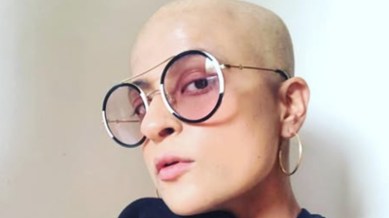📣 For more lifestyle news, click here to join our WhatsApp Channel and also follow us on Instagram
‘Bald look for woman is synonymous with a disaster somehow’: Tahira Kashyap on her parents’ reaction to her photo after breast cancer diagnosis
“I didn’t know how to make my parents speak to me so I video called my mother and showed myself to her,” Tahira Kashyap said.

A cancer diagnosis can be life-altering, not just for the individual but also for their loved ones.
Actor Ayushmann Khurrana’s wife Tahira Kashyap recently opened up about her battle with breast cancer and how while she faced the disease with strength, she also had to navigate the reactions of those around her — including her own parents, who struggled to accept her decision to share a bald photo of herself on social media.
monthly limit of free stories.
with an Express account.
In an interview with Filmfare, she said, “My parents got really upset with me when I put my bald picture of myself (after the cancer diagnosis). A bald look for a woman is synonymous with a disaster somehow, so they refused to talk to me and were forcing me to take it down. But I said, ‘I am not doing that. I am celebrating right now, which you need to understand.’ They actually thought I had lost it. They were like, ‘How can you celebrate physical illness?’”
She added, “I didn’t know how to make my parents speak to me so I video called my mother and showed myself to her. I said, ‘Look at me, this is how I look right now and I am loving it.’ I was also wearing goggles and she sort of laughed and smiled. And then I told her this is how life is, and I am happy and you need to be happy for me. They were still clueless about ‘feeling happy’.”
Hair loss due to cancer treatment is often an emotional challenge, particularly for women, as societal norms associate long hair with femininity. Tahira’s experience highlights the stigma surrounding visible signs of illness and how patients often have to manage not just their health but also the expectations of others.
Why does hair loss, especially in women, carry such a deep societal stigma, and how can patients cope with the emotional impact?
Neha Cadabam, senior psychologist and executive director at Cadabams Hospitals, tells indianexpress.com, “Hair is often seen as a symbol of femininity, beauty, and identity. When cancer treatments cause hair loss, it can feel like an unwanted erasure of a key element of personal identity, leading to feelings of vulnerability, loss, and lowered self-esteem. Coping with this emotional impact involves acknowledging these feelings and seeking supportive counseling or therapy. Engaging in support groups, whether in-person or online, can help patients share their experiences and learn coping strategies from others who understand their struggles. Techniques such as mindfulness, self-compassion, and focusing on aspects of identity beyond physical appearance also empower patients to redefine their self-worth.”
How should family members support a loved one undergoing visible changes due to cancer treatment?
Cadabam notes, “Family members play a crucial role in the emotional well-being of a loved one facing visible changes from cancer treatment. It begins with education: understanding that these physical changes are a part of the treatment process and not a reflection of the patient’s identity can help ease resistance. Families are encouraged to maintain open and empathetic communication, actively listening to the patient’s concerns without judgement.”
Rather than focusing solely on appearance, she says, family members should emphasise the patient’s strength, resilience, and the ongoing journey of healing. Seeking joint counseling sessions or family therapy can also provide a safe space for everyone to express their emotions, learn about the changes occurring, and build a more supportive environment that reinforces unconditional love and acceptance.
📣 For more lifestyle news, click here to join our WhatsApp Channel and also follow us on Instagram